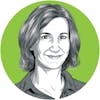 See
more of the story
ST. CLOUD – Kayla Okonu wanted to talk about the racist posters plastered all over town.
See
more of the story
ST. CLOUD – Kayla Okonu wanted to talk about the racist posters plastered all over town."Hate speech is free speech" and "unapologetically white" fluttered from posts and poles all over downtown St. Joseph, Minn. It was February 2018, and a group calling itself the White Student Union had gone leafleting.
Kayla was an eighth-grader. By the time the White Student Union hit town, she knew how it felt to be called racial slurs and have people touch her hair without asking. A classmate said her hair made her look like she'd been "dragged from the rafts of hell." A classmate told her racism didn't exist in America anymore.
But when Kayla asked school administrators to discuss those "You Will Not Replace Us" signs, the answer was no.
"We're not prepared to handle these conversations," Okonu and her mother, Angel Hight, said they were told. "We have teachers who aren't comfortable talking about it."
This week, Kayla tried again.
In a crowded auditorium in St. Cloud, she faced a panel that included both a former neo-Nazi and the state attorney general, and she asked for help.
"I've had racist remarks, I've had people call me [a racial slur], I've had people touch my hair," said Okonu, who's now 14 years old. "I need to feel welcome, and I need to feel accepted."
Minnesota Attorney General Keith Ellison, a black Muslim man from Minneapolis, is leading a statewide conversation on race and hate, one town at a time. For months, he's been hearing stories of hate, hurt and isolation in a state where there's been a 22% jump in reported hate crimes.
The immigrants afraid to answer the knock on the door. The gay students harassed on campus. The family in Fergus Falls whose Labor Day picnic was interrupted by a car full of white men who pulled up to scream a racial slur at them.
At a listening session at a Minneapolis synagogue, another 14-year-old girl talked about the anti-Semitic slurs she hears so often that her friends have started to shrug them off, as if that's just the way the world is now.
The way things are isn't the way things have to be.
Christian Picciolini, a former white supremacist, was recruited into a Chicago skinhead chapter when he was an alienated, bullied 14-year-old. These days, he runs the Free Radicals Project, and he tries to help others escape violent extremist groups and make amends to the people they once terrorized.
For Picciolini, it started with a record shop he opened and stocked with racist music he imported from Europe. But he also stocked a corner of the store with other genres, and the customers who browsed those stacks represented everything he thought he hated. Some were gay, some were black, some were Jewish.
It was, he said, his first meaningful interaction with the people he thought were his enemies.
Eventually, he said, he realized he had more in common with those customers than he did with the hate group he was leading.
"Violence is what we do when we don't know what else to do with our suffering," he said. "Every one of us in this room is failing everyone else in this room. We are all broken."
Picciolini joined Ellison in St. Cloud, a city whose last attempt at a hate-crime forum was postponed by protests; a city known to readers of the New York Times as the place where residents bristle at the sight of Somali-Americans "just walking around."
Tuesday night's forum wasn't about an article in the New York Times, Ellison said, and there's nothing happening in St. Cloud — good or bad — that isn't happening everywhere else in Minnesota.
"St. Cloud is not worse than other places," Ellison said. "What we're trying to do is make sure it's a little bit better."
Kayla Okonu, at least, left St. Cloud feeling better than when she arrived.
She's at a new school now, and she's hoping to organize a festival someday to celebrate what her community has in common and rejoice in its differences.
"Coming in, I was so nervous. I was shaking, I was near tears," she said. "After? I was so happy. Everyone was so receptive and so welcoming … That feeling's so amazing."




